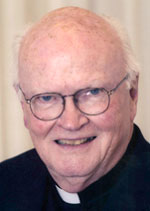Villanova is a suburban community on Philadelphia’s tony Main Line, which takes its name from the main line of the Pennsylvania Railroad headed west toward Pittsburgh and Chicago.
Now the whole world knows that Villanova is also a basketball-playing university whose coach, Jay Wright, is a well-dressed George Clooney lookalike, whose team just won the NCAA Division I men’s national championship with a buzzer-beating, three-point shot against the University of North Carolina.
Villanova is also well-known as a Catholic university founded in 1842 by the Augustinians. Its coat of arms bears the words “Veritas, Unitas, Caritas” understood by the more than 10,000 undergraduate and graduate students to mean “Truth, Unity, and Charity,” words intended to infuse campus life with purposeful direction.
[hotblock]
I serve on an advisory board to the dean of the Villanova School of Business and have a front-row seat to observe the institution’s academic progress. In the wake of the university’s on-court basketball success, I can’t help but recall that Boston College’s football prominence in 1984 under the leadership of Heisman Trophy-winning quarterback Doug Flutie created what the Boston College admissions staff called the Flutie factor running up the number of undergraduate applications to record highs. That is certainly now going to happen at Villanova.
It was understandable but unkind for USA Today to take the occasion of the NCAA men’s tournament to publish on March 31, 2016, a list of salaries, not including special bonuses, for the head coaches of the competing teams. Villanova paid Jay Wright $2,477,245; North Carolina paid Roy Williams $1,998,169.
I say unkind because no mention is made of charitable contributions these men may have made. Nor is it acknowledged that there is a market out there for big-time coaches, and market-driven forces determine their salaries. It is regrettable, of course, that coaches earn more than professors and that tuition-dependent university budgets, of necessity, pit tuition-paying students over against generously compensated coaches.
The jubilant Villanova students, however, seem not to mind.
The economics of higher education display a lot of unevenness, if not unfairness. This picture is not likely to change in the foreseeable future. Faculty and staff are not going to get rich, and students will continue to struggle to meet the price of higher education. I say price, not cost, because the price tag in the private sector (curious that we call it “private” because it is certainly open to qualified applicants from the public who are willing to pay) is never representative of the full cost.
Generally speaking, we will see a continuing shift in enrollment from independent, privately financed institutions of higher learning to government-sponsored publicly financed colleges and universities. This, in my view, is not a positive development. If basketball and, to a lesser extent, football can help to stem this shift, I say go for it. That means “Go Nova!” “Go Hoyas!”
Hang in there, you independent veritas-unitas-caritas schools. And do everything possible to reinforce the hope continuously expressed on the campus where I live, namely, that “The Hawk Will Never Die!”
***
Jesuit Father Byron is university professor of business and society at St. Joseph’s University in Philadelphia. Email: wbyron@sju.edu.
PREVIOUS: Seeing the world with the eyes of a child
NEXT: Pope points out our responsibility to immigrants




As V.U. 1967 grad and father of S.J.U. 2000 grad– we say “GO NOVA”.